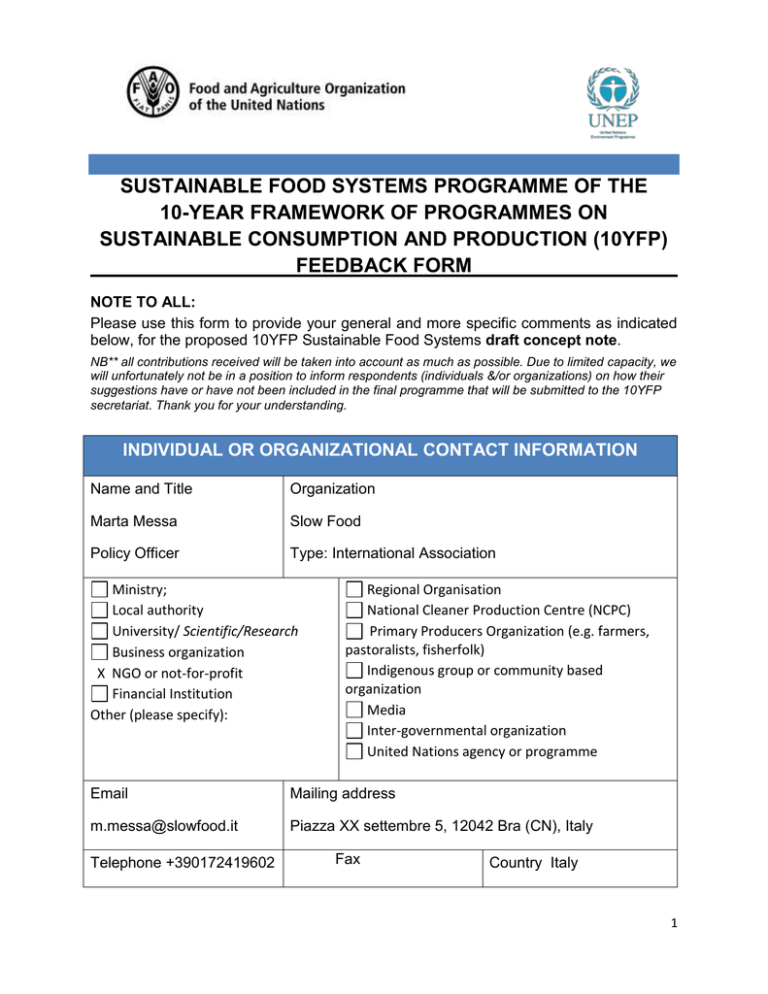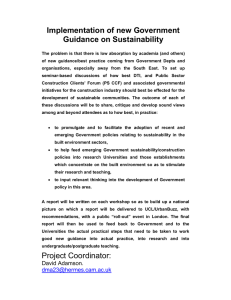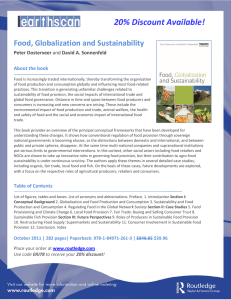SUSTAINABLE FOOD SYSTEMS PROGRAMME OF THE 10-YEAR FRAMEWORK OF PROGRAMMES ON
advertisement

SUSTAINABLE FOOD SYSTEMS PROGRAMME OF THE 10-YEAR FRAMEWORK OF PROGRAMMES ON SUSTAINABLE CONSUMPTION AND PRODUCTION (10YFP) FEEDBACK FORM NOTE TO ALL: Please use this form to provide your general and more specific comments as indicated below, for the proposed 10YFP Sustainable Food Systems draft concept note. NB** all contributions received will be taken into account as much as possible. Due to limited capacity, we will unfortunately not be in a position to inform respondents (individuals &/or organizations) on how their suggestions have or have not been included in the final programme that will be submitted to the 10YFP secretariat. Thank you for your understanding. INDIVIDUAL OR ORGANIZATIONAL CONTACT INFORMATION Name and Title Organization Marta Messa Slow Food Policy Officer Type: International Association Ministry; Local authority University/ Scientific/Research Business organization X NGO or not-for-profit Financial Institution Other (please specify): Regional Organisation National Cleaner Production Centre (NCPC) Primary Producers Organization (e.g. farmers, pastoralists, fisherfolk) Indigenous group or community based organization Media Inter-governmental organization United Nations agency or programme Email Mailing address m.messa@slowfood.it Piazza XX settembre 5, 12042 Bra (CN), Italy Telephone +390172419602 Fax Country Italy 1 Instructions: Please provide your feedback for each of the proposed questions on the Sustainable Food Systems Programme by completing the following matrix. If you do not have any comments please check the “No comment” box. General “Sustainable Food Systems” Programme Feedback Feedback Question Select One Having reviewed the draft Concept Yes Note, does it adequately identify the X No main global challenges for sustainable food systems? Provide Your Additional Comments The Concept Note does not adequately identify the main global challenges for sustainable food systems, as it does not take into account the following issues: 1. Ensuring the socio-cultural sustainability of food production and consumption (see below) 2. Global food production, food wastage, access to natural resources and to food: according to the Food and Agriculture Organization of the United Nations (FAO), the world already produces enough food to feed every child, woman and man and could feed 12 billion people, or double the current world population. This underlines clearly that there is a clear global challenge of access to food, access to the resources for producing it, and the state of these resources. The current food production and consumption system not only has a considerable impact on the environment, but also on the access of local communities to limited resources. The incidence of land grabbing, as well as heavily export oriented policies supporting the cultivation of export crops (e.g. sugar cane, soya for animal feed etc.) provide clear evidence of the socio-cultural, environmental and economic unsustainability of the current global food system. 3. Granting the right to food for everyone: The proposed vision of the 10YFP-SFSP should also make reference to global challenge of the 2 fulfillment of the right to food, as defined by Olivier De Schutter: the right to have regular, permanent and unrestricted access, either directly or by means of financial purchases, to quantitatively and qualitatively adequate and sufficient food corresponding to the cultural traditions of the people to which the consumer belongs, and which ensure a physical and mental, individual and collective, fulfilling and dignified life free of fear.1 4. Loss of traditional knowledge: local and global communities are experiencing a loss of traditional knowledge and values, which goes hand in hand with a decline in cultural diversity and the dilution of a sense of community. This process of impoverishment of traditions is reflected in the present global food system which, hinging on the idea that local agriculture must serve the global market, transforms food into a mere commodity and compels people to conform to a single way of producing and consuming food. In this scenario, cultural, social and environmental costs are extremely high. In order to counter such phenomena, it is essential to undertake projects aimed at gathering, reinforcing, preserving and promoting traditional material and immaterial heritage, which must be perceived as the founding element of any community. Traditional knowledge is in the process of reemerging as a priority at the global level, and is increasingly being recognized as constituting the tangible and intangible heritage of humanity. Slow Food defends traditional knowledge, as a source of wisdom and know-how that lies at the core of technical and scientific learning. If properly protected, it can become a vital element in local economic systems and help spread environmentally friendly methods of food production and consumption 5. Globalized markets vs local food supply chains: In today’s world, the 1 http://www.ohchr.org/EN/Issues/Food/Pages/FoodIndex.aspx 3 globalized market economy is showing its many limits in terms of wastefulness and damage to the environment. The micro-economies of local communities have the potential to work in a way that is financially rewarding and respectful to surrounding ecosystems, human health and cultures. Shorter distribution chains allow producers to sell their products directly to consumers (direct sale). It is an alternative strategy enabling producers to regain an active role in the food system, focusing on local production - decentralized regional food systems that minimize the number of steps involved and the distance travelled by food (food miles), as well as all costs and potential losses (i.e. food losses) involved. A short supply chain also makes it easier to achieve a fair price, as consumers can better understand the “real” costs of agriculture and food production. In addition, the often-high costs charged by distributors can be split fairly between producers and consumers, allowing producers to receive a dignified income for their work, and for consumers to pay less, knowing exactly what they are paying for. Local food production must be appreciated as a form of both cultural and physical nourishment for any community, and for this reason must be supported and promoted. 6. Finding adequate tools for traditional virtuous small scale farmers: tools and schemes that are bureaucratically too cumbersome, or that demand investments tailored for large / industrial productions, make it impossible for small farmers to adhere to such schemes, and drive them out of the process. Having reviewed the proposed Yes Vision and Goal, do they adequately X No address the needs of the global programme? The proposed Vision and Goal do not take into account a fundamental aspect of food production and consumption: culture. We suggest amplifying the definition of sustainability, so as to also include socio-cultural sustainability: a socio-culturally sustainable food system guarantees fair access to fundamental rights (safety, health, education, etc.) and conditions of well being (education, social relations, etc.) within a community, provides opportunities to create and 4 develop internal and external relations involving the community, and recognizes the cultural value of a product. All three aspects of sustainability (economic, environmental, socio-cultural) cannot be considered separately. They are strongly interrelated and need to be analyzed using an integrated, holistic approach. A holistic approach entails recognizing the close interdependence of different aspects of food production and consumption, generally perceived as distinct features: economic aspects, environmental aspects and socio-cultural aspects. Objectives such as protecting biodiversity, fighting climate change, developing local economies and small-scale production and safeguarding local knowledge, traditions and culture should not be interpreted separately. Instead, each goal must be set and pursued as part of an overall strategy that takes all the other elements into account simultaneously. We need a holistic approach because food is a living system, whose fundamental constitutional characteristic is complexity. The Goal should also read: “whilst granting the right to food for every human being” Having reviewed the proposed objectives, do they adequately address the needs of the global programme? Yes X No As indicated in the Concept Note, the premise of the objectives is the following: 112 In order to pursue this goal, the 10YFP-SFSP must aim its activities towards protecting natural 113 resources and promoting a more efficient use of natural resources, products and recovered materials. The focus on the efficient use of natural resources, products and recovered materials (i.e. environmental sustainability) risks being misleading if sociocultural and economic sustainability are not taken into consideration at the same time, as explained above. 5 114 This has to be done based on a solid scientific and policy knowledge base, by improving resource 115 efficiency and reducing the pollution intensity of food systems, all along food chains, from production 116 to consumption, while improving food and nutrition security. The activities of the 10YFP-SFSP should not only be based on scientific and policy knowledge, but must also be grounded in traditional knowldge. Innovation and research should go together with preserving traditional knowledge and the dialogue between these realms is more than necessary. Traditions should be preserved through a vertical dynamic exchange between generations and a horizontal exchange among communities of different countries or of different worlds (science and traditional knowledge). Provide Your Feedback Programme Objectives Programme Objective 1: Raise awareness on the need to shift to sustainable food systems and applying a systems approach to addressing No Comment Suggested Text Change Additional Feedback (check the box) (Please insert your text) (Please insert your text) Raise awareness on the need to shift to sustainable food systems and applying a systems approach to The proposed vision of the 10YFPSFSP should also make reference to the fulfillment of the right to food, as reported above. 6 Programme Objectives Provide Your Feedback food security and nutrition. addressing food security and nutrition, with particular attention to the right to food. Programme Objective 2: Build capacity and enabling conditions for the uptake of sustainable practices across food systems and facilitate access to financial and technical assistance. Build capacity and enabling conditions for the uptake of sustainable practices across food systems, support already existing sustainable practices and facilitate access to financial and technical assistance. It should be acknolwedged that sustainable practices already exist and should be supported, shared and their replication encouraged. Programme Objective 3: Take stock of, categorize and disseminate – and if needed develop – accessible and actionable information tools and methodologies to support governments, the private sector, consumers and other relevant stakeholders to act towards more sustainable food systems. Programme Objective 4: Bring together initiatives and develop partnerships to build synergies and cooperation to leverage resources towards the mutual goal of promoting, enhancing and facilitating X The participation of farmers in these processes is an essential element in ensuring the spread of sustainable practices and, for this reason, the horizontal sharing of knowledge among farmers is of 7 Programme Objectives Provide Your Feedback crucial importance, as well as among communities of different countries or of different worlds (science and traditional knowledge). the shift towards more sustainable food systems Feedback Question Are there additional fundamental objectives that the programme should respond to in your view? Having reviewed the proposed work areas, do they adequately address the needs of the global programme? Select One X Yes Provide Your Additional Comments Granting the right to food to all human beings and future generations. No X Yes No Provide Your Feedback Programme Work Areas No Comment Suggested Text Change Additional Feedback (check the box) (Please insert your text) (Please insert your text) 8 Programme Work Areas Programme Work Area 1: Increase the availability, accessibility and sharing of actionable knowledge, information and tools for SCP. Provide Your Feedback Among the activities encompassed under this work area there should also be the strengthening of food information to consumers. Slow Food believes transparent labels are more conducive to the promotion of sustainable production methods. The conventional approach to food analysis and information does not allow us to understand if a food has been produced in a way that respects the environment, animals and social justice/workers' rights. In fact, communication is often purposefully misleading, vaguely conjuring up rural worlds full of poetry, supposedly authentic techniques and ambiguous references to traditional flavors. The evocative images often bear little relationship to the actual characteristics of the products being marketed. Often it is the most natural 9 Programme Work Areas Provide Your Feedback products and those of sustainable small scale farmers that end up being penalized. Their labels are perfectly legal but brief, and do not provide much information about varieties and breeds, cultivation and processing methods, areas of origin, animal welfare. Transparent and informative labels would allow sustainable producers to highlight the qualities of their productions and consumers to make informed decisions. Programme Work Area 2: Encourage, facilitate and support inclusive multi-stakeholder dialogue to help inform interconnected policymaking towards sustainable food systems at local, national, regional and international levels. Programme Work Area 3: Facilitate the use and enhance opportunities for market-based and/or voluntary approaches throughout supply chain towards sustainable food systems. Attention should be paid to the challenges of enhancing opportunities for voluntary approaches. At EU level, for instance, voluntary approaches in 10 Programme Work Areas Provide Your Feedback stopping profitable Unfair Trading Practices have been so far ineffective (see for instance the report “Food, Inc. Corporate concentration from farm to consumer”, 2003) Feedback Question Are there other work areas you think should have priority, if so, what? Can you propose priority activities under the Work Areas, if so, what? Select One Yes X No Yes Provide Your Additional Comments It is fundamental to involve different actors through different work areas and activities to ensure the effectiveness of the SCP. If only part of the actors are involved, or if only a limited range of activities are implemented, the SCP will not be able to succeed. As above. X No Other Feedback on the document Line Number Reference 56-59 Provide Your Feedback We suggest making reference to the following: according to the Food and Agriculture Organization of the United Nations (FAO), the world already produces enough food to feed every child, woman and man and could feed 12 billion people, or 11 Line Number Reference 60-63 170-171 Provide Your Feedback double the current world population. It should be considered that the current food production and consumption system not only has a considerable impact on the environment, but also on the access of local communities to limited resources. The incidence of land grabbing, as well as heavily export oriented policies supporting the cultivation of export crops (e.g. sugar cane, soya for animal feed etc.) provide clear evidence of the socio-cultural, environmental and economic unsustainability of the current global food system. To manage limits is the first sustainability exercise. There are limits that we need to manage, and beyond which there is no growth but rather regression: economic loss, environmental loss and cultural impoverishment. If the document underlines the environmental aspect of sustainability without equal attention to socio-cultural and economic issues, it risks providing an incomplete analysis of the issue. Reference to sustainable intensification should be accompanied by two clarifications: 1. sustainable intensification has been defined as a form of production wherein “yields are increased without adverse environmental impact and without the cultivation of more land”2; however, if we look at the data on food production (see FAO data mentioned above), the challenge of the current and future food system is food security in terms of access to food and natural resources, rather than in terms of quantity of food produced. It is then questionable whether sustainable intensification should be the goal of the 10YFP-SFSP. 2. attention should be given to different methods of sustainable management of natural biological processes and their impacts, see for instance agroecology. Today, agricultural science and practice are reorienting themselves towards more sustainable practices and are reconsidering the value of traditional agricultural models. These often use methods that preserve soil fertility, varietal choices and rotation and intercropping practices that can represent the most efficient and effective way of maintaining the productive capacity of agricultural systems. 2 The Royal Society (2009). Reaping the benefits: science and the sustainable intensification of global agriculture, London. 12 Line Number Reference Provide Your Feedback 172-173 According to Slow Food, sustainable agricultural practices develop around the concept of agroecology: it is is based on the conservation and management of agricultural resources through participation, traditional knowledge and adaption to local conditions. One of agroecology’s greatest concerns is agrobiodiversity, considered a primary component of agroecosystems and a source of ecosystemic services. The uptake of new technologies should be done in a dynamic exchange with traditional methods, as explained above. 177-178 Local supply chains should be also facilitated as they are key to achieve the goals of the work area 2: encourage, facilitate and support inclusive multi-stakeholder dialogue to help inform interconnected policymaking towards sustainable food systems at local, national, regional and international levels. 13

